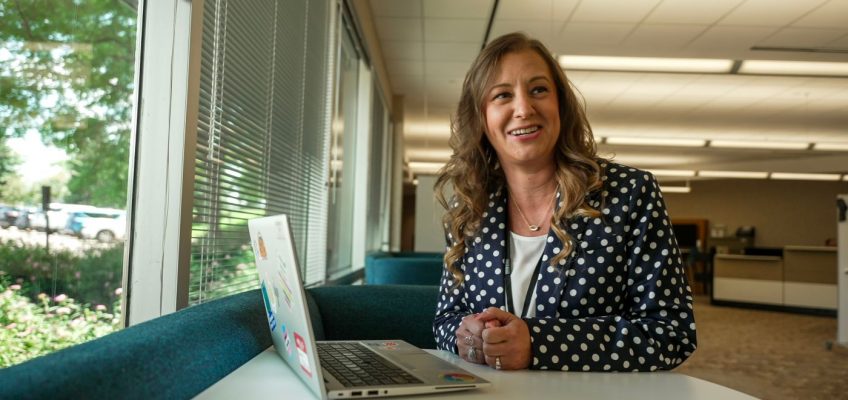It wasn’t until Heather Lococo’s daughter was born with cocaine in her system that she knew she had to receive treatment. Losing her kids to foster care was the turning point for her. She started 29 days in a treatment center and then started going to recovery meetings and spending time with people who didn’t use drugs or alcohol.
That was 2005.
“Everybody that knew me wanted me to get help,” said Lococo. She has had two relapses since then but is currently 10 years sober. Now she has her temporary permit as an alcohol and drug counselor (ADC-T) and works as a program manager at Partners Behavioral Healthcare. She’s also studying social work at Bemidji State University.
“I know the struggle. So I want to see people succeed in life,” she said.
Lococo and Melissa Mikkonen, who is a principal program manager of Medicaid health at Blue Cross and Blue Shield of Minnesota, share a commitment to equitable access in addiction-recovery care.
Both say that many people working in the recovery community are in their own long-term recovery. “I think that that’s really powerful when you can be professional and also share your recovery story … because then people who are on their journey can see, hey, that’s attainable for me,” said Mikkonen.
Mikkonen says “an epidemic of loneliness” is contributing to addiction in society. “I think that we’re all together all the time, but we’re all still really feeling quite alone.”
Melissa Mikkonen is a program manager at Blue Cross and Blue Shield. She aims to provide easy and accessible addiction recovery care. “It’s on us to not only have good, solid programs, but to make that accessible information, so that they can find those programs easily.” (Yasmin Yassin)
She sees building community as the key to recovery. Mikkonen goes out into the community a lot, and she thinks it is very important to build programs that are reflective of the people she serves. She loves to travel to all the different parts of Minnesota and says that “different parts of the state have different needs.”
Lococo elaborated that putting people of different backgrounds and cultures together with the expectation that they will all learn the same and understand the same is really difficult. Lococo says there needs to be more culturally based treatments.
Treatment looks different for everyone. Mikkonen says Blue Cross offers programs both for people who need substance use disorder treatment “within four walls” and for those who don’t need residential treatment but still need structure. They offer virtual IOP, intensive outpatient treatment, for substance-use disorder. According to research on IOPs, 12% suffering from substance-use disorder were being treated with IOPs. The demand for these programs is huge, and these programs wouldn’t be possible without funding.
Mikkonen says the federal “Big, Beautiful Bill” threatens access to treatment. According to an article in USA Today, 12 million to 20 million people are at risk of losing Medicaid coverage. “That’s the thing that keeps me up at night,” said Mikkonen.
For those who don’t have insurance, Mikkonen recommends Portico, which, according to its mission statement, helps uninsured individuals and families access affordable coverage and care. She said Blue Cross works with Portico a lot. She says counties can also be a resource.
Lococo said most people know someone with drug or alcohol problems. According to American Addiction Centers and the National Survey on Drug Use and Health, 50% of Americans know someone who struggles with substance-use disorder. Addiction is widespread, but Lococo wants people to know that addiction recovery is possible.
“It’s hard, but it’s doable,” she said.
The first time Mikkonen had an impact on someone in recovery sticks with her. She says that seeing someone be stable and successful felt so wonderful, because it was like being part of their family. She wants them to know that when they are ready, Blue Cross is there to help.
Heather Lococo, second from left, graduated from Minnesota North College, Mesabi Range, in May 2025. She celebrated with her community and sons Anthony Hall. left, Chad Hall, second from right, Steven Niece.(Photo courtesy Heather Lococo)
Lococo hopes those struggling with addiction don’t ever give up hope: “I was the black sheep of my family, so it was, ‘oh, don’t let her over’ …But now, because of what I’ve done with my life, I think it’s really, actually opened up a lot of people’s eyes.”
Lococo’s journey provides an example of what’s possible through recovery. Once homeless, she’s now about to close on a house of her own: “Everything’s changed, everything: my relationships with people, my relationships with family, friends, the world is my oyster,” she said.
Additional reporting by JJ Moore (Jefferson High School) and Amelia Mani (DeLaSalle High School)
About this report
This story was produced as part of ThreeSixty Journalism’s Multimedia Storytelling Institute for high school students in partnership with Blue Cross and Blue Shield of Minnesota, which financially sponsors the camp and supports story sourcing. ThreeSixty Journalism is a multimedia storytelling program for Minnesota youth. Grounded in the principles of journalism and focused on contributing to more accurate narratives and representative newsrooms, ThreeSixty offers technical, ethical, and entrepreneurial training for fulfilling careers in storytelling and civic leadership. It has been housed at the College of Arts and Sciences at the University of St. Thomas since 2001.


Leave a Reply